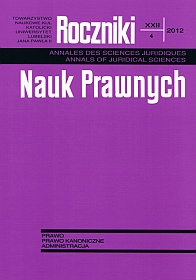Ethical State of Law as Seen by Pope Benedict XVI
Abstract
The article attempts to reconstruct the concept of an ethical state of law present in the teaching of Pope Benedict XVI. The Authors remind us that prior to becoming the Bishop of Rome Joseph Ratzinger levelled thorough critique at the project of modernity that came into being in the wake of the Enlightenment world view. He was also critical of the antihumanistic aspects of intellectual trends associated with post-modernism. Among the crucial aspects under criticism was a tendency in law and politics to capture a human being in a reductionist and one-dimensional manner as a being that is capable of functioning in isolation from God. Rejecting the postulate of creating a state and legislation based solely upon supposed indications of the reason or upon the unlimited power of public authority, Ratzinger stressed the importance of ethical guidelines grounded in rules of appropriate conduct for a person or society, which in his view have a universal reference, proclaimed by Christianity. Isolating those rudimentary principles of conduct, Benedict XVI outlined the basis for a concept of an ethical state of law. The novelty of this perspective was that he consistently combined the positivist and modern construct of a state of law with a system of ethical principles of religious and natural-law nature. The import of his deliberations is strongly felt in the context of current debates and in the scope of lawful interference of state law in the basic existential spheres, such as life, family, or marriage.
Copyright (c) 2012 Roczniki Nauk Prawnych

This work is licensed under a Creative Commons Attribution-NonCommercial-NoDerivatives 4.0 International License.


